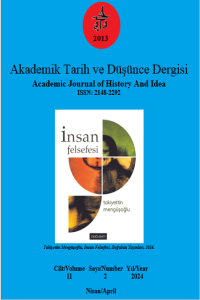Öz
The article explores some topics about the essence of dialogue in general and discusses the crucial role of dialogue in resolving a number of conflicts in modern times. The author paid special attention to inter-religious dialogue and provided detailed information on the conditions necessary for the organization of such events. Interreligious dialogue is not only a means of communication, but also a mechanism that creates conditions for the establishment of relations between different schools of thought. Dialogue is essentially based on such sublime values as universality, universality, brotherhood, religious and cultural diversity, freedom of thought and belief, and pluralism. All these principles, which are important for the formation of this culture and, in this regard, the civilized environment, originate from international law based on humanistic values and progressive ideas of different religions. These principles embody the spirit and nature of international religions, as well as universal humanist ideas. The article also examines many issues related to the goals and benefits of interreligious dialogue and provides a comparative analysis.
Anahtar Kelimeler
Kaynakça
- Flecha, R. (2000). Sharing Words. Theory and Practice of Dialogic Learning. Lanham, Rowman and Littlefield.
- Hasan, M. X. (2008). al-Hiwar manhajan wa saqafatan. Doha, Matba`atu Qatar.
- Leonard, S., Khalid, D., Reuven, F. (2007). Trialogue: Jews, Christians, and Muslims in Dialogue. Twenty Third Publication.
- Masih, Y. (2000). In a Comparative Study of Religions. Delhi, Motilal Banarsidass Publishers.
- Nakamura, H. (1964). The Ways of Thinking of Eastern Peoples. University of Hawaii Press.
- Rifai, M. H. (2013). Malik Fahd School. Riyadh.
- Suleyman, V. (1976). al-Hivar baynal-adyan. Cairo, Hey`atu published
Öz
The article explores some topics about the essence of dialogue in general and discusses the crucial role of dialogue in resolving a number of conflicts in modern times. The author paid special attention to inter-religious dialogue and provided detailed information on the conditions necessary for the organization of such events. Interreligious dialogue is not only a means of communication, but also a mechanism that creates conditions for the establishment of relations between different schools of thought. Dialogue is essentially based on such sublime values as universality, universality, brotherhood, religious and cultural diversity, freedom of thought and belief, and pluralism. All these principles, which are important for the formation of this culture and, in this regard, the civilized environment, originate from international law based on humanistic values and progressive ideas of different religions. These principles embody the spirit and nature of international religions, as well as universal humanist ideas. The article also examines many issues related to the goals and benefits of interreligious dialogue and provides a comparative analysis.
Anahtar Kelimeler
Kaynakça
- Flecha, R. (2000). Sharing Words. Theory and Practice of Dialogic Learning. Lanham, Rowman and Littlefield.
- Hasan, M. X. (2008). al-Hiwar manhajan wa saqafatan. Doha, Matba`atu Qatar.
- Leonard, S., Khalid, D., Reuven, F. (2007). Trialogue: Jews, Christians, and Muslims in Dialogue. Twenty Third Publication.
- Masih, Y. (2000). In a Comparative Study of Religions. Delhi, Motilal Banarsidass Publishers.
- Nakamura, H. (1964). The Ways of Thinking of Eastern Peoples. University of Hawaii Press.
- Rifai, M. H. (2013). Malik Fahd School. Riyadh.
- Suleyman, V. (1976). al-Hivar baynal-adyan. Cairo, Hey`atu published
Ayrıntılar
| Birincil Dil | İngilizce |
|---|---|
| Konular | Bilgi Modelleme, Yönetim ve Ontolojiler |
| Bölüm | Makaleler |
| Yazarlar | |
| Erken Görünüm Tarihi | 5 Mayıs 2024 |
| Yayımlanma Tarihi | 7 Haziran 2024 |
| Gönderilme Tarihi | 10 Şubat 2024 |
| Kabul Tarihi | 15 Nisan 2024 |
| Yayımlandığı Sayı | Yıl 2024 Cilt: 11 Sayı: 2 |

